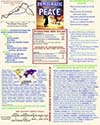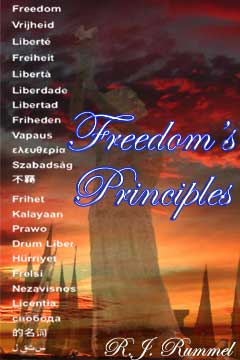What? Hitler was Not Elected?
Frequently, those who oppose the democratic peace argue that Hitler was elected democratically in 1932, and therefore World War II in which Hitler fought many democracies shows that democracies make war on each other. Then there are those who recognize that Hitler seized total power in Germany and therefore at the time of the war, it was not a democracy. Still, even some of them believe Hitler was elected, and that proves the inherent danger of democracies electing tyrants.
First, Hitler was never elected. He ran in two national elections in 1932. In the first, he got 30 percent of the vote, and no one got a majority. In the resulting runoff election, he increased his votes to 37 percent, while his opponent, World War I hero Field Marshall Hindenburg, got a majority. And since the Nazi party won 230 seats out of 608 in the Reichstag, it did not have the majority to make Hitler Chancellor.
So how did this happen? By backroom backstabbing, double-crossing, threats, and promises, including among former Chancellor Franz von Papen, present Chancellor Lieutenant General Kurt von Schleicher, and the elected President Hindenburg. Their maneuvering, a rumor of a threatened military coup, and the urging von Papen, who had entered into a secret alliance with Hitler to get supporters into Cabinet positions, finally persuaded Hindenburg to reluctantly appoint that “little corporeal” Hitler chancellor. Many involved in this intrigue, including von Papen, thought that this would bring Hitler under their control.
As Chancellor, then, how did Hitler turn this functioning democracy into a bloody, totalitarian dictatorship? I’ll let the History Learning Site answer this (link” http://www.historylearningsite.co.uk/Nazi_Germany_dictatorship.htm”>link here):
When Hitler was appointed in January 1933, Germany was a democracy. Germany had fair elections; nobody had their right to vote abused; there were numerous political parties you could vote for etc. To pass a law, the Reichstag had to agree to it after a bill went through the normal processes of discussion, arguments etc. Within the Reichstag of January 1933, over 50% of those who held seats were against the Nazi Party. Therefore it would have been very unlikely for Hitler to have got passed into law what he wanted. . . .
Hitler had promised a general election for March 1933. . . . One week before the election was due to take place, the Reichstag building burned down. Hitler immediately declared that it was the signal for a communist takeover of the nation. Hitler knew that if he was to convince President Hindenburg to give him emergency powers – as stated in the HYPERLINK “http://www.historylearningsite.co.uk/weicons.htm”Weimar HYPERLINK “http://www.historylearningsite.co.uk/weicons.htm” Constitution – he had to play on the old president’s fear of communism. What better than to convince him that the communists were about to take over the nation by force?
A known communist – Marianus van der Lubbe – was caught near the Reichstag building immediately after the fire had started. Those that arrested him – Nazi officials – claimed that Lubbe confessed to them that the fire was a signal to other communists to start the revolution to overthrow democracy in the country. Matches were allegedly found on van der Lubbe and those who arrested him claimed that he smelt of petrol.
Hitler asked Hindenburg to grant him emergency powers in view of the ‘communist takeover’. Using the constitution, Hindenburg agreed to pass the Law for the Protection of the People and the State.
This law gave Hitler what he wanted — a ban on the Communists and Socialists taking part in an election campaign. The leaders from both parties were arrested and their newspapers were shut down. To ‘keep the peace’ and maintain law and order, the HYPERLINK “http://www.historylearningsite.co.uk/nazi_police_state.htm” SA (the Brown Shirts) roamed the streets beating up those who openly opposed Hitler.
The election took place in March — though Hitler was convinced it would be the last. Hitler did not get the number of votes he wanted but he did get enough to get over a 50% majority in the Reichstag. . . .
After the burning down of the Reichstag, politicians had nowhere to meet. The Kroll Opera House in Berlin was chosen. This was a relatively small round building – perfect for meetings. On March 23rd, elected officials were due to meet to discuss and vote on Hitler’s Enabling Law.
As politicians neared the building, they found it surrounded by SS and SA thugs who tried to ensure that only Nazi or Nationalist politicians [in coalition with the Nazis] got into the building. The vote for this law was crucial as it gave Hitler a vast amount of power. The law basically stated that any bill only needed Hitler’s signature and within 24 hours that bill would become law in Germany. With only Nazis and other right wing politicians inside the Kroll Opera House, the bill was quickly passed into law. The act gave Hitler what he wanted — dictatorial power. What he wanted would become law in Germany within 24 hours of his signature being put on paper.
On 7th April 1933, Nazi officials were put in charge of all local government in the provinces.
On May 2nd 1933, trades unions were abolished, their funds taken and their leaders put in prison. The workers were given a May Day holiday in return.
On July 14th 1933, a law was passed making it illegal to form a new political party. It also made the Nazi Party the only legal political party in Germany.
And then Hitler’s “night of long knives,” purge and murder of 5,000 members of his own SA to make sure there was no dangers from fellow Nazis; the development of concentration camps; the arrest or murder of anti-Nazis, communists, and Jews; the euthanasia campaign to wipe out the severely handicapped; World War II, the Holocaust, and murder of tens of millions in Hitler’s defeated and occupied countries; the defeat and destruction of Germany; the Soviet creation of its communist empire in Eastern Europe, and with its nuclear weapons, its rise to confront the United States as a superpower; and the Cold War. Finally, in 1991, ended these huge bloody waves of death and destruction this one man, Hitler, caused, as though a large asteroid had blasted into a black ocean.
Note that during his Beer Hall putsch of 1923 in Munich, Hitler launched an unrealistic attempt to rally the public and take over the government. As Hitler and his supporters “marched on Berlin” they were met by police lines blocking their path. Someone fired a shot, and the police then fired into the crowd of marchers, where Hitler and his bodyguard were in front. His bodyguard was hit, and wrenched Hitler to the ground, dislocating his shoulder. Goring was shot in the leg, and 14 marchers and 4 policemen were killed.
Think about how the world would have been changed if one of those many bullets had killed Hitler. And think of this, when commentators treat the present as though the inevitable outcome of irresistible forces. Because one man survives a hail of bullets, everything – everything — human in the world is changed.
Link of Note
”Bush-Hitler Links” A webpage of the Fallout Shelter News
This is for those of you who may not appreciate how crazy, in the full meaning of the word, some of the hatred of President Bush has become.








Informative history. It is very important for the world to know how things happened. IMHO, a lack of knowledge of the road to Holocaust, will lead to its repetition. Thank you for doing this.
Just so the douschebag left know Hitler was a lefty who Hugo Chavez admires enough to emulate.